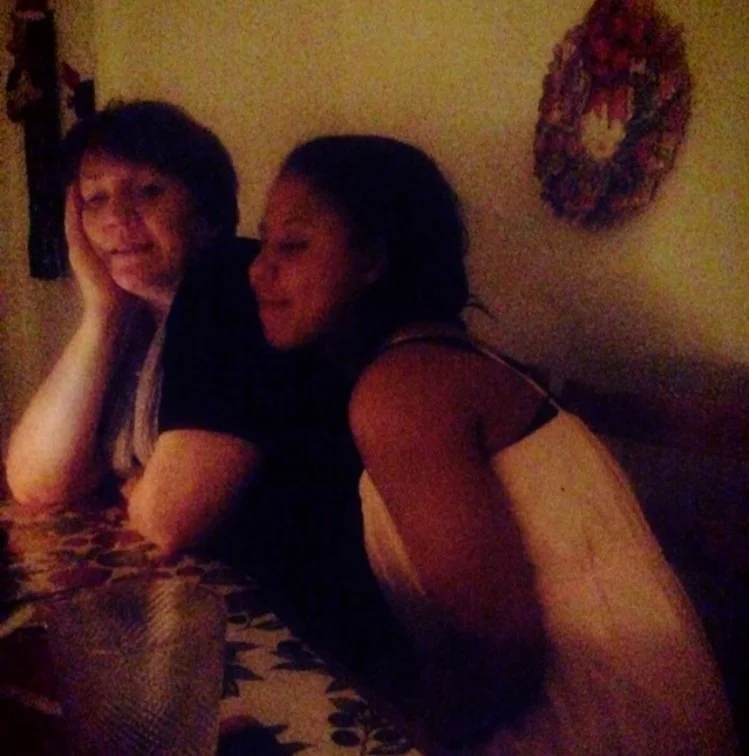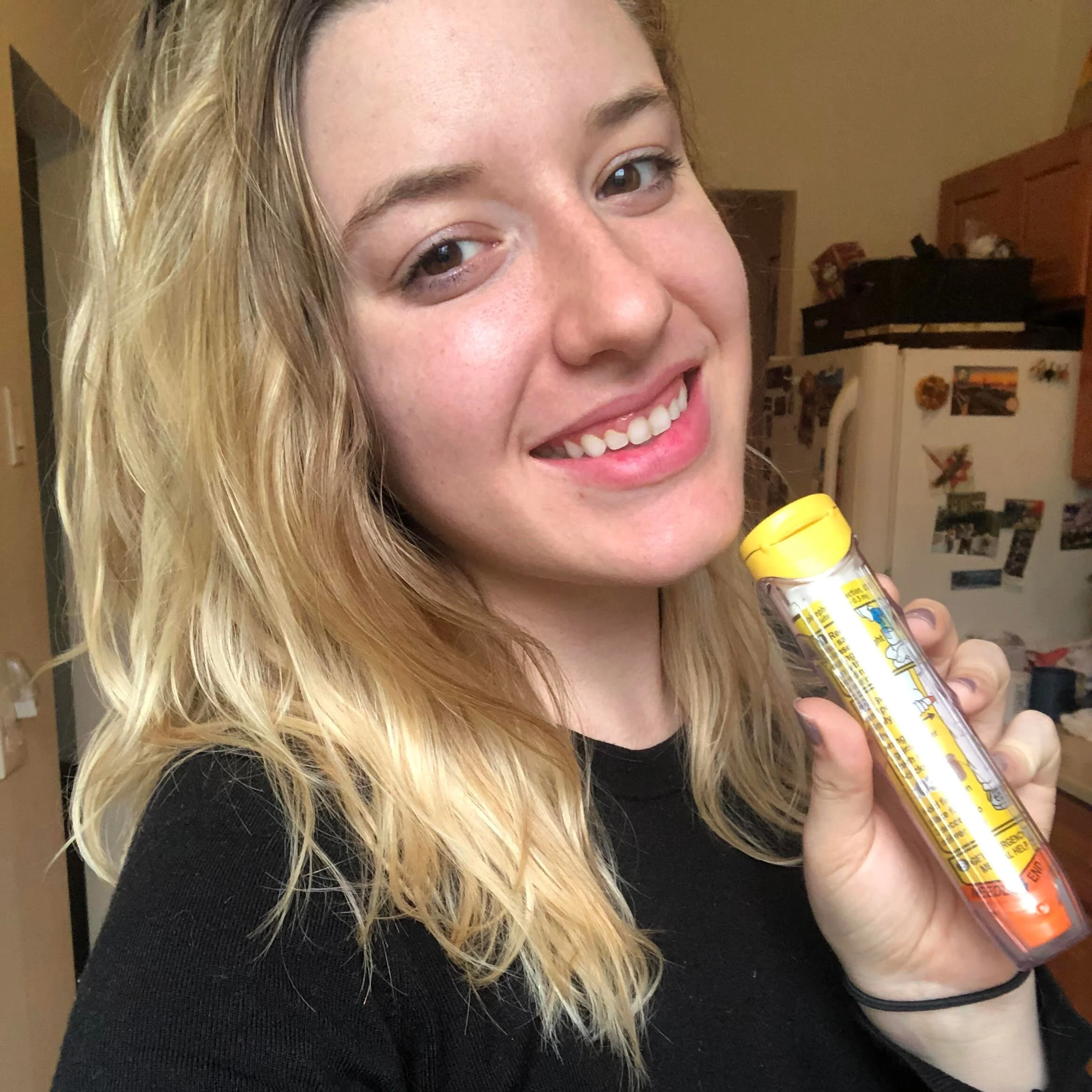"The biggest difficulty was that people thought I was overreacting"
Strong, caring, smart, independent, boss, funny... those are a few words that spring to mind when I talk about my mother. I grew up in awe of her (I still am). As I get older I realise how hard it must have been to keep me safe with my allergies, especially at a time when the world thought we were all cry babies, but she managed -- I wanted to have a chat with her about it. She is always busy and she was in a foreign country at the time I was making this post so she wrote her answers in - I hope you enjoy and please let me know who protected you or who you protect with allergies.
“A doctor once said to me that the big mistake that people make is to delay using the epipen.”
The Chat
Did you know anyone with severe allergies before you had me?
Yes - your aunt, my sister-in-law had severe allergic reactions to nuts and had suffered a major attack soon before you were born after she had east a slice of fruit tart that unknown to her had ground almonds in the pastry. It was a frightening moment.
Where were the struggles with me when I was a baby/toddler? ie. licking, touching, people holding me.
When you were a baby it was easier because people usually wash their hands when holding a baby to prevent germs being passed on. But of course, your diagnosis was when you were between 10 and15 months and you were a toddler. I just told everyone as much as I knew whenever I could so that they could put away nuts and only feed you what we agreed etc. and told people how to use the EpiPen once you were giving it. Of course, so much was being learned then. There is more information now and more understanding generally.
Did you have to do any research when you discovered my allergies? What did you find out?
Yes - luckily the Anaphylaxis Campaign was set up in 1994 after a highly-publicised death of a young woman who had eaten a slice of lemon meringue pie at a well-known department store’s cafe. The Anaphylaxis Campaign provided excellent information, alerts and training. And still does.
We were also lucky in living near St Mary’s Hospital in Paddington where Dr Gideon Lack was the new expert in anaphylaxis at the time. The hospital was great in providing information and support. But I have been trying to understand this issue ever since.
What were the problems you had to overcome?
Well, one big difficulty - and it still is - was that people did not understand how serious it was - some people thought I was overreacting or exaggerating. There was a myth that persisted that children did not react in an anaphylactic way - so it was better to treat with antihistamines rather than adrenaline. Lots of different people held very strong ideas and parents were often left quite confused and unsupported.
Another big problem is that people are unaware of what is in the food they buy. For example, not knowing that mayonnaise is made from eggs (yes, really) or that tahini is made from sesame (yes, really). Some people just thought that anything ‘natural’ or organic should be fine and that the real problem was added chemicals.
The biggest problem though was when you suddenly became allergic to new things that you had previously been able to eat. When you were 8 years old that was kiwi and other tropical fruit and then when you were in your late teens it was to shellfish & squid. All of those things you used to be able to eat when you were younger so that was very hard to manage.
What were the initial fears? How did you manage them?
Well of course my initial fears were that you would die - and you have come close a few times. I also feared that you would be wrapped in cotton wool and never take any risks - which would be no good for you at all. So I managed by letting you do everything that all your friends and classmates did but always sent you with your own food. I also talked with you about it all the time so that you had agency and could feel in control of decisions and you knew how to use an EpiPen and could explain it to people.
We talked all the time about what you should do if you had a reaction so that if it did happen you know very well what to do as we had planned it. That became more and more effective as you grew older and you saved your own life on several occasions.
Schooling. How did my schools respond? Did they take any precautions/did they push back?
The schools were fine. They took it very seriously and undertook training and took precautions, talked to the other children and their parents. Sometimes the parents were not so supportive. Some expressed anger that they were being asked not to give nuts and sesame to their children to eat at school. But mostly they were concerned and kind.
When/how did you know I needed to cook for myself?
Both of my children are great cooks - you would have learned to cook even if you didn’t have allergies. I almost always cook everything from scratch as I try to avoid preservatives and processed food. You loved cooking and we used to hold baking parties with friends.
Any fears with my allergies in our home?
Of course! Sometimes I bought things that had ‘may contain traces’ without seeing the tiny writing or indeed had nuts or sesame written so small in the ingredients that I couldn’t see it. There were occasions when I bought the wrong thing thinking it was the usual thing I bought. This is why you always double-check now and do not take my word for it.
How did you feel when I left home? Did you think I was prepared?
Yes, I think you were prepared. You were always very sensible and aware, taking responsibility for your own health. You understood about cross-contamination. I think having an aunt with anaphylactic reactions to some of the same things as you also meant you could consult and share things with her in a way that gave you confidence.
Do you think about my allergies now? How has it changed? Are you still careful?
All the time. Every time I get a text message that says something cryptic like “call (your friends’ name) asap” or “probs”(this means probably - she isn’t used to txt speak) or ‘I love you’ out of the blue I think something may have happened and I have to breathe deeply and keep a lid on any panic I might be feeling until I can get hold of you.
I do not allow nuts or sesame into the house and I am really careful how I handle fruit or shellfish so that it cannot cross-contaminate.
What are somethings you would like to say for people who have children with allergies or their partners?
As soon as possible, talk with your children, their friends, their parents...about what to do in case of an attack. Act rather than wait. A doctor once said to me that the big mistake that people make is to delay using the EpiPen - don’t give antihistamine and hope that it will work. Use the EpiPen immediately, then add in antihistamine and get medical attention. This advice has always stuck with me.
Anything else you would like my readers to know?
Life is to be lived and it is always risky. Avoiding life, avoiding opportunities is not the answer. Embracing all this planet has to offer while acknowledging and mitigating risks as you go is the best way for a happy, fulfilled life.
I still have so many questions I want to ask her but that can be for another Q&A in person.
I hope you enjoyed what she had to say. If you have any questions or comments let me know!


